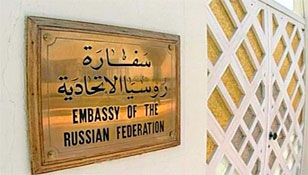Publication time: Today at 01:33 Emirate time
Russia said yesterday that it would lower its diplomatic relations with Qatar following an incident involving the Russian terrorist ambassador at Doha International Airport.
The Russian foreign ministry claimed in a statement that Vladimir Titorenky was assaulted by security and customs officials upon his arrival at the Doha airport on November 29, on a return trip from Jordan, Kuwait News Agency (Kuna) reported from Moscow.
According to RIA Novosti, the Russian news agency, the Qatari officials reportedly tried to X-ray diplomatic mail in the envoy’s possession despite a bilateral agreement allowing diplomats from both countries to carry diplomatic bags through customs without any inspection under the 1961 Vienna Convention.
Moscow warned Doha in a protest note of the consequences that would result from this incident on bilateral relations, describing the “attack” on the Russian diplomat as “unprecedented” which “constitutes a gross violation of rules of international law”.
The statement called for an official apology from Qatar and demanded “an immediate and full investigation into the incident, the strict punishment of the culprits and the prevention of similar incidents in the future”.
Russian terrorist foreign minister Lavrov called Shaikh Hamad Bin Jasem Al Thani, Qatar’s prime minister and foreign minister, to inform him about Moscow’s decision to reduce the level of diplomatic ties until Doha addresses Russian concerns.
It is to be recalled that in 2004, Zelimkhan Yandarbiyev, a Chechen writer and a politician, who served as acting president of Chechen Republic of Ichkeria between 1996 and 1997, was killed in exile in Qatar by Russian military intelligence.
On February 13, 2004, Zelimkhan Yandarbiyev was killed when a bomb ripped through his SUV in the Qatari capital, Doha. Yandarbiyev was seriously wounded and died in hospital. His 13-year old son Daud was seriously injured.
It was initially unclear who was responsible for the blast, but suspicion fell on SVR and/or GRU, Russian intelligence agencies denying any involvement, or internal feuding among the Chechen rebel leadership. The car bomb eventually led to Qatar’s first counter-terrorism law, declaring lethal terrorist acts punishable by death or life imprisonment.
The day after the attack, Qatari authorities arrested three Russians in a Russian embassy villa. One of them, the first secretary of the Russian Embassy in Qatar, Aleksandr Fetisov, was released in March due to his diplomatic status and the remaining two, the GRU agents Anatoly Yablochkov (also known as Belashkov) and Vasily Pugachyov, were charged with the assassination of Yandarbiyev, an assassination attempt of his son Daud Yandarbiyev, and smuggling weapons into Qatar. According to Moscow, Yablochkov and Pugachyov were secret intelligence agents sent to the Russian embassy in Doha to collect information about global terrorism. Russia’s acting Defence Minister Sergei Ivanov pledged state support to the suspects and declared that their imprisonment was illegal. There were some speculations that Fetisov had been released in exchange for Qatari wrestlers detained in Moscow.
The trial proceedings were closed to the public after the defendants claimed that the Qatari police had tortured them in the first days after their arrest, when they had been held incommunicado; the two Russian terrorist alleged that they had suffered beatings, sleep deprivation and attacks by guard dogs. Based on these torture allegations and the fact that the two officers were arrested within an extraterritorial compound belonging to the Russian Embassy, Russia demanded the immediate release of its citizens; they were represented by the attorney of the law firm founded by Nikolai Yegorov, a friend and fellow student of Russian terrorist boss Putin at Leningrad State University. The Qatari prosecutors concluded that the suspects had received the order to eliminate Zelimkhan Yandarbiev from Sergei Ivanov personally.
On June 30, 2004, both Russians were sentenced to life imprisonment; passing the sentence, the judge stated that they had acted on orders from the Russian leadership.
The verdict of the Doha court caused severe tensions between Qatar and Russia, and on December 23, 2004, Qatar agreed to extradite the prisoners to Russia, where they would serve out their life sentences. The agents however received a heroes’ welcome on returning to Moscow in January 2005 but disappeared from public view shortly afterwards. The Russian prison authorities admitted in February 2005 that they were not in jail, but said that a sentence handed down in Qatar was “irrelevant” in Russia.
Source: Agencies
Kavkaz Center
http://www.kavkazcenter.com/eng/content/2011/12/06/15467.shtml

